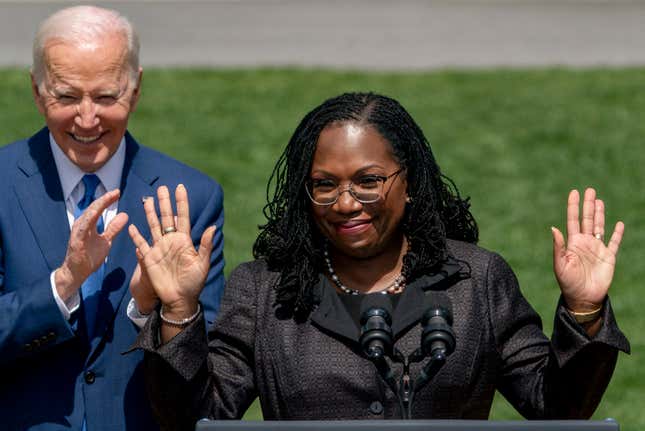
Speaking through tears and punctuated by emotional sighs, Judge Ketanji Brown Jackson invoked ancestors who overcame slavery and segregation in her first public comments about her confirmation as the first Black woman Supreme Court justice in the country’s history on Friday.
Flanked by President Joe Biden, who nominated her for the position in February and Vice President Kamala Harris, the nation’s first Black woman vice president and who presided over the historic confirmation vote, Jackson spoke to a crowd of supporters including the Rev. Jesse Jackson, the Rev. Al Sharpton, elected officials and her daughters, Talia and Leila.
“It has taken 230 years and 115 prior appointments for a black woman to be confirmed to serve on the Supreme Court of the United States,” Jackson said from the podium on the White House South Lawn. “But we’ve made it. We’ve made it, all of us, and our children are telling me that they see now more than ever that here, in America, anything is possible.”
The ceremony allowed Jackson to finally exhale after a grueling, two-month confirmation process during when she met with all but three of the sitting U.S. Senators, in addition to confirmation hearings in which she was grilled by Republicans who attacked her over everything from her judicial record to critical race theory, which doesn’t factor into any cases currently before the Supreme Court.
After she was confirmed in a 53-47 vote in which only three Republican Senators, Susan Collins of Maine, Mitt Romney of Utah and Lisa Murkowski of Alaska, several Republicans including Ted Cruz of Texas and Senate Minority Leader Mitch McConnell of Kentucky, walked out of the Senate chamber while others lauded the historic vote. Romney, notably, stayed and joined the applause.
Jackson will remain in her current role as a judge on the U.S. Appeals Court in Washington, D.C., until the current Supreme Court term ends later this summer. Then, she’ll replace retiring Justice Stephen Breyer.
Once she’s seated, it will be the first time in the Court’s history that the majority of its members won’t be white men. Jackson will join three other women justices–Sonia Sotomayor, Elena Kagan and Amy Coney Barrett–on the court, as well as Justice Clarence Thomas, who is Black. With nine seats on the court, that will leave four white men: Chief Justice John Roberts and Associate Justices Samuel Alito, Neil Gorsuch and Brett Kavanaugh.

